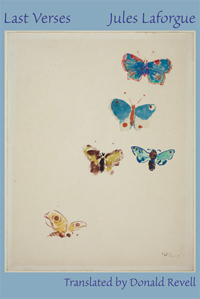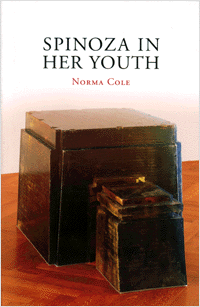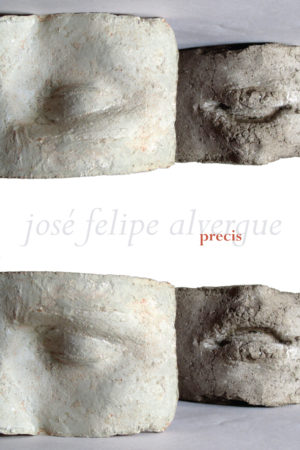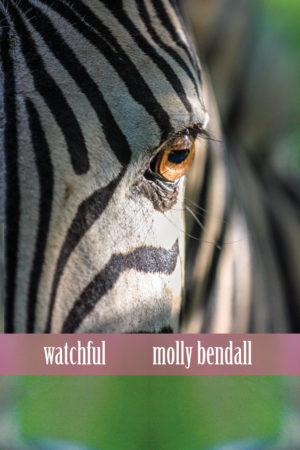Description
Translated by Donald Revell
French on facing pages
The Last Verses of Jules Laforgue is the first full-length collection of free verse published in the French language and, in many ways, it remains far in advance of any free verse innovations conjured in the past one hundred years and more. Laforgue, in his famous Complaints and Harlequinades, was a profound influence upon such Modernist poets as Eliot and Pound. Yet in his Last Verses he set a precedent which no one as yet has managed to emulate or to advance. Why should this be? Simply put, Last Verses does not reject poetic formalism but, rather, projects it into uncharted and unvoiced regions of spiritual and sexual extremity. The freedom of these poems rests entirely in the purity of their despair, a purity not to be measured by any extant means. This music is made by no instrument but itself. This music is made on the farther shore of death.
About the Author
Reviews
Excerpt
Among the most innovative of poets in the French language, Laforgue was an important influence on the young T S Eliot and called and “exquisite poet” by Ezra Pound. Called both part-symbolist and part-impressionist, his associative method, speech-rhythms and heterogeneous diction make him one of the most individual French poets. Laforgue died at the age of 27 in 1887.
Donald Revell is Professor of English & Director of Creative Writing programs at UNLV. Thief of Strings is his tenth poetry collection, published by Alice James. Donald Revell’s previous translations include The Illumninations by Arthur Rimbaud, and A Season in Hell by Arthur Rimbaud, both of which were published by Omnidawn. A Season in Hell won the PSA translation award. His books of essays include Invisible Green: Selected Prose, published by Omnidawn. He serves as poetry editor of Colorado Review. Revell lives in the desert south of Las Vegas with his wife, poet Claudia Keelan, and their children Benjamin Brecht and Lucie Ming.
An interview with Donald Revell, translator
(conducted by Rusty Morrison)
Jules Laforgue is a central figure in modernism, a profound influence upon such poets as Eliot and Pound. In your “Translator’s Afterword,” you’ve given your readers much insight into the value of Last Verses. And, as you have said elsewhere, in his Last Verses, “he set a precedent which no one as yet has managed to emulate or to advance.” But would you talk about your personal experience with Laforgue? When did you first read him? When/how did his work become important to you? &/or evolve for you?
I first read Laforgue as an undergraduate, guided to him by my early passion for T.S. Eliot. Back then, it was Laforgue’s harlequinades and complaints that delighted me, exactly those poems that provided Eliot with his rhythms and personae. But in recent years, it has been the anguished, unguarded and entirely unique music of Last Verses that has captivated and, from time to time, consoled me. These are poems written in extremis, and yet their integrity, their courage, never falters. Eventually, it is too late for masquerades. Eventually, the truth is the better mask to wear.
You are an esteemed translator of Rimbaud and Apollinaire. Of course, each creative project is unique, so there must be myriad differences (in your process, in problems, in pleasures) between these translation projects. But, now that you can look back on these three projects, are there any particular differences that might be interesting to talk about or describe?
I must and do think of each of these poets as a brother and a friend. Their poems have companioned me since my teens. Thus, the process of translation was always the same: a LONG period of intimacy followed by a sudden, headlong embrace in which the boundaries between their minds and mine began to disappear. One cannot translate Rimbaud without being, however briefly, Rimbaud. And so, in my later life, I ached to be Laforgue and to know what he meant by Derniers Vers. In plain fact, I needed his company. Just as in earlier days I needed Apollinaire’s jocund sorrow and then Rimbaud’s visionary tendresse.
Did you put thought into the order in which you translated them? Why did you wait to translate Laforgue?
I waited because Laforgue’s early poetry has already been splendidly translated. And through Eliot and Pound it has long since entered the canon. However, Derniers Vers has somehow been languishing in the wings. No young poet could hope to translate it (unless he was dying of tuberculosis in a crummy apartment beside a beloved dying of the same disease), but finally I reached an age and mind when it seemed very urgent to try.
What, specifically, were some of the largest or most daunting challenges you faced as you worked through this text? Where there any unexpected surprises that opened in the text for you in the act of translation?
The most daunting challenge that faced me was exactly that which faced Laforgue—i.e. to give up all pride and all artifice; for once in my life to EXCLAIM and then to go on exclaiming. I have always thought of poetry as an articulate courtesy. Not anymore.
Now that some time has elapsed since completing this translation, would you say that your act of translating Laforgue has had an impact on you personally or upon your writing? Has your relationship to either Laforgue or to your own work changed (in ways you did or did not expect) because of the focused attention you’ve brought to the work?
I love Humphrey Bogart’s line in The African Queen: “I gave myself up for dead a mile back.” Laforgue’s Derniers Vers has taught me to give myself up for dead. And it feels just fine. Nowadays, when I sit down to write, I’m not bothered by any sense of a continuing project. I write a line, and then I write another, and God help them all.
You chose the artwork that was used in the cover design for this translation. Can you talk about your reasons for this choice?
Those butterflies of Redon seem to me souls soaring towards the exit.
When you read translations by other poets, what questions do you bring to those texts? What are you looking for? What stimulates your interest? and what sustains your interest?
I am always on the lookout for shameless intimacy and hopeless devotion. I find them only seldom, but surely they are there and luminous in Eshelman’s translations of Vallejo and in Slavitt’s translations of Ovid and Virgil. A translator must always be willing to make a fool of himself for love.
Who are the writers you are reading currently for kinship? Who are the writers you are reading currently to be challenged?
I’m a little too old for challenges. But for kinship? As always, John Clare and Hart Crane. And of contemporaries…I thank God every day that John Ashbery has written what he has written. Every book of his is a mansion, and all the doors are open wide.
Laforgue’s extremes come off superbly, neither too familiar nor antique, in the clean lines of Revell, admired for his own poetry as well as for other translations, including Rimbaud—whose fans should check Laforgue out ASAP.
Revell is doing his best to put Laforgue’s poetry into contemporary consciousness. There’s no translation-ese here. If Laforgue through Revell sounds like he could be writing right now it’s because, metaphorically speaking, and through the long and too often unrecognized history of French influence on American poetry, he is.
Revell locates the despair of a man who knows that his days—and the days of his beloved—are numbered. It is no easy task to translate the emotional pressure that death exerts on the poetic imagination.
Donald Revell … has given us, in his version of Laforgue’s posthumously published Last Poems, a dozen linked poems that show us Laforgue at his least typical. Here, in poems written under circumstances that truly focus the mind (Laforgue was young, in love, and dying) we see the poet self-consciously struggle to overcome his own habits of reticence, to break through irony, pessimism, alienation, and cynicism, and arrive at a sincerity of expression made urgent by his situation.
VI. Simple Agony
Pariah!—the tender feelings of May return.
But shame on you! You only repeat yourself.
You puff yourself up but never burst.
Pariah, you know damn well
Nothing matters at all.
Okay!
I have the unique music to imagine
The loneliest moment in all the world,
And the music rises into the night sky, swells
To say a thing that is, is.
And then it dies away. And then it begins again,
Breaks hearts,
O sobbing aria,
It begins again and dies away,
As it must.
God help
My crucified music
Nailed to a photograph
Of a woman staring at the moon.
Find other themes,
More deadly, more supreme.
The world is the World, okay;
I’ll make a poisonous world of my own.
Musical souls,
Pedophile minds…
Cacophony,
Barbarity,
Despair.
Every holiday
An inquest and autopsy!
Why not?
I fill my bed with newspapers and dirty underwear,
Postcards and lingerie catalogues,
The whole economy,
The motherland.
Stay away;
There’s no cure for me.
Only one thing left to do:
Smash everything.
Cacophony,
Barbarity,
Despair!
It’s useless to rage and resist.
We could never be as cruel as life is:
Gentle animals are beaten without mercy,
And women are ugly…
Stay away from me;
It’s time to smash everything.
Alleluia, Pariah Earth.
From dawn until dusk,
Nothing but despair.
First there’s nothing, and then more nothing.
Dusk until dawn.
Alleluia, Pariah Earth.
The artists have declared:
“Too late.”
And why not say
Doomsday.
Aux arms, citoyens! We’re all INSANE.
He caught cold in the autumn,
Stayed out too late for love of the sorrowing horns
At the end of a fine day.
It was because of the hunting horns, because of the autumn,
He showed us how to die for love!
Holidays may come and go, but we won’t see him
Locked behind the iron door of History.
He came too soon, he left with his innocence intact.
If you can read this, go home.





